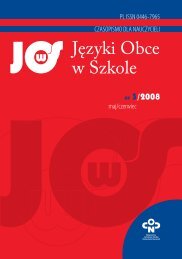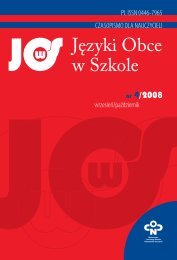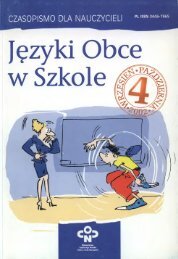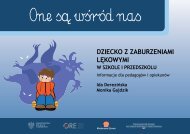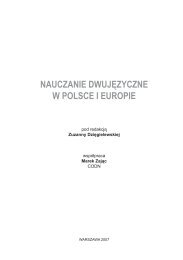JÄzyki Obce w Szkole - Biblioteka Cyfrowa OÅrodka Rozwoju Edukacji
JÄzyki Obce w Szkole - Biblioteka Cyfrowa OÅrodka Rozwoju Edukacji
JÄzyki Obce w Szkole - Biblioteka Cyfrowa OÅrodka Rozwoju Edukacji
Create successful ePaper yourself
Turn your PDF publications into a flip-book with our unique Google optimized e-Paper software.
Języki <strong>Obce</strong> W <strong>Szkole</strong> n r 5/2008 l i s t o p a d/g r u d z i e ń<br />
lity and were used for decorating their homes<br />
and altars.<br />
The Romans, celebrated Saturnalia – a holiday<br />
in honor of Saturn, the god of peace and<br />
agriculture. Beginning in the week just before the<br />
winter solstice and continuing for a full month,<br />
Saturnalia was a hedonistic time, when food and<br />
drink were plentiful, gifts were exchanged, and<br />
the normal Roman social order was turned upside<br />
down. 3.<br />
. Peasants were in<br />
command of the city. Business and schools were<br />
closed so that everyone could join in the fun.<br />
Public gathering places were decorated with flowers<br />
and candles.<br />
Also around the time of the winter solstice, Romans<br />
celebrated Juvenalia, a feast honoring the<br />
children of Rome. In addition, members of the upper<br />
classes often celebrated the birthday of Mithra,<br />
the god of the unconquerable sun, on December<br />
25. It was believed that Mithra, an infant god, was<br />
born of a rock. For some Romans, Mithra’s birthday<br />
was the most sacred day of the year.<br />
In the early years of Christianity, Easter was<br />
the main holiday; the birth of Jesus was not celebrated.<br />
In the fourth century, church officials<br />
decided to institute the birth of Jesus as a holiday.<br />
Unfortunately, the Bible does not mention date<br />
for his birth. Lucas, the Evangelist, writes ‘shepherds<br />
were keeping watch over their flock by night’<br />
which suggests that Jesus’ birth may have occurred<br />
in the spring, the only time when shepherds<br />
must watch their flock because sheep give birth<br />
to their lambs, so at first it was established for<br />
the 6 January, and only Pope Julius I changed the<br />
date to December 25. 4.<br />
. First<br />
it was called the Feast of the Nativity (the birth<br />
of Jesus Christ). Soon it spread to Egypt, England<br />
(in the sixth century) and to Scandinavia (in the<br />
eighth century).<br />
Christmas held at the same time as traditional<br />
winter solstice festivals gradually replaced pagan<br />
religion, however adopted some of the pagan<br />
traditions. 5.<br />
. The poor went to<br />
the houses of the rich and demanded their best<br />
food and drink. If they were not given what they<br />
wanted, the visitors often terrorized the owners<br />
with mischief. The feasting, drinking, caroling for<br />
money and frequent excesses (riotous behavior)<br />
presented a drastic contrast with the simplicity<br />
of the Nativity and true spirit of Christmas,<br />
so finally, Oliver Cromwell cancelled Christmas.<br />
6. .<br />
Christmas Day is the first of the Twelve Days<br />
of Christmas. The period is the amount of time<br />
it took the three magi, or wise men, to travel to<br />
Beth lehem for the Epiphany, the revelation of Jesus<br />
Christ as the savior and the son of God („epiphany”<br />
is from the Greek word for „revelation”).<br />
Today, in the Greek and Russian orthodox<br />
churches, Christmas is celebrated 13 days after<br />
the 25th, which is also called the Epiphany or<br />
Three Kings Day, the day when the three wise<br />
men finally found Jesus in the manger.<br />
Scan the text again and decide whether the statements<br />
are true or false.<br />
1. Jesus Christ was probably born between March<br />
and May.<br />
2. From the winter solstice days are getting longer.<br />
3. Many pagan gods were believed to be born<br />
on 25 December.<br />
4. Christmas has always been the most important<br />
Christian holiday.<br />
5. The magi reached Bethlehem two weeks after<br />
Jesus’ birth.<br />
6. Christmas has been celebrated on 25 December<br />
since the very birth of Jesus.<br />
Key:<br />
I. 1. reindeer, 2. gingerbread, 3. carols, 4. holy,<br />
5. Saint Nicolas/Santa Claus/Santa, 6. Santa’s sleigh,<br />
7. baubles, 8. mistletoe, 9. lights, 10. wreath,<br />
11. stockings, 12. Christmas tree, 13. Santa’s hat,<br />
14. chimney, 15. snowman.<br />
II. 1. church, the midnight mass, 2. the first star in<br />
the sky, Christmas Eve supper, 3. presents 4. some<br />
cookies and a cup of milk, 5. carols, 6. Christmas<br />
cards, Merry Christmas and a Happy New Year,<br />
7. Christmas Eve supper, 8. the place, 9. the table,<br />
one set of plates, 10. share the wafer, 11. Christmas<br />
dishes, 12. decorate, 13. some Christmas<br />
shopping.<br />
III. 1. mistletoe, 2. gingerbread, 3. Christmas tree,<br />
4. angel, 5. candles, 6. wreath, 7. Christmas pudding,<br />
8. nativity, 9. nut cracker, 10. Magi (Three<br />
Wise Men), 11. baubles, 12. snowman, 13. carollers,<br />
14. stockings.<br />
162



